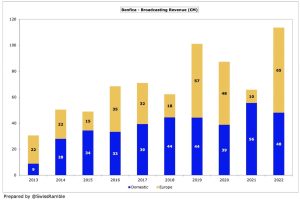Guest post by long time friend of the podcast, Marco Lopes from South Africa – follow him on twitter err…X @FootyML
Arguably the best reflection of Benfica’s defeat against Real Sociedad was summarised by Benfica fan @Pedge21 when he tweeted “No goals, no points, no clue. At risk of small sample size theatre, 3 European defeats in a row combined with a fairly tepid start to the Liga campaign should be sufficient to draw some initial conclusions about the season thus far for Benfica.
A disclaimer: This sounds obvious, but ultimately, Benfica should be measuring themselves above all against their progress in the Champions League, more than any other competition. The financial impact of the riches from Europe’s top tier holds massive significance for Benfica, relative to the sources of funds they enjoy from domestic football or commercial revenues. Ultimately, every squad they build should be judged based on its capacity to compete to the knockout stages of the Champions League. (For clear evidence of this, see a quick snapshot below from the excellent @SwissRamble’s work to scribe the recent 2022 view of Benfica’s broadcasting revenue where their European run earned them more than any amount ever earned from domestic broadcasting money).
click to enlarge
I’ll give credit to Benfica that they certainly indicated intent and action to spend money in the transfer window. That said, as this blog will discuss, the jury’s out as to whether the club’s choices in terms of quality were adequate & if they didn’t perhaps stop short of recruiting properly in a couple of key roles.
The sale of Goncalo Ramos was inevitable off the back of a good World Cup showing & a solid campaign. Ironically, he wasn’t always considered to be the most proficient forward & there were those brave Benfiquistas amongst the fan base who theorised that better could be found. However, Ramos wasn’t even adequately replaced, let alone improved upon.
On the displays provided, Musa, Tengstedt & Cabral have not provided sufficient evidence to show that they are anywhere near required Benfica quality. I’m reminded of players like Mitroglu or Lima who made a far quicker impact in goals, tactical fit or both. None of the current centre forward options in the squad tick either or both of these criteria in the Primeira Liga, let alone Europe. It’s tempting to think that potential superstars like Joao Felix are the only ways to solve such problems, but Benfica has a healthy history of finding gems that many clubs aren’t paying enough attention to.
The lack of goals isn’t just a function of the lack of a “matador”. The team’s overreliance on individual ingenuity seems to have become more prevalent. To their credit, both Rafa Silva & Angel Di Maria have delivered superbly in compensating with the goalscoring load while many others around them have been lacking.
In recent years, the speculation on the future of Alejandro Grimaldo was often a primary transfer topic, With every passing season, various different sentiments emerged on the player’s future but it became clear that by the end of the 22/23 season, Benfica & Grimaldo would go their separate ways. What is considerably surprising is that a club, lauded for over a decade on its excellent player sales track record, would allow a left back like Grimaldo to leave for free with no compensation back to the club, especially considering how short in supply half decent left backs are in football. And let’s be clear before we proceed – regardless of defensive inconsistencies or not, Grimaldo fits squarely in the category of good, solid left back. Benfica’s choice to replace him with David Jurasek is speculative at best. Juan Bernat is a far more experienced & more serviceable option but hasn’t yet played his way into the team, instead losing out to utility man Fredrick Aursnes (more on him later). On the opposite flank, Gilberto’s replacement Alexander Bah, like most of Benfica’s performances, has been tepid.
In midfield is where much of the season’s evolution is most difficult to explain. In one respect, the emergence of young starlet Joao Neves has to be acknowledged, & his inclusion in many a Benfica matchday squad is one of the Roger Schmidt decisions that won’t disagree with. But Neves’ midfield partner is much more complex. Florentino Luis was a crucial part of the midfield success in last year’s campaign & yet his ball-winning talents haven’t been called upon consistently this season. Record transfer Orkun Kokcu hasn’t enjoyed a good start to his Benfica career, but like Luis, is also struggling to find an obvious way to tactically fit. As for other midfield options like Chiquinho, all that has been reinforced is a view that he likely shares the same stage with those players at the club who just aren’t of the required Benfica standard.
Norwegian Fredrik Aursnes has played at left back, right back, wing & in central midfield for Benfica. His ability to serve as a utility man can feel like a tactical cheat code in a vacuum. But in Benfica’s case, the vacuums are in short supply. It’s unclear if there is really a meaningful tactical advantage by having the right footed Aursnes AND the right footed Joao Mario both on the left side, forcing a situation where neither is comfortable to offer the natural width a left footed player offers on that flank. Aursnes may be useful in how he fills gaps in the squad, but it surely must be time to find one permanent home for him, where his role doesn’t compromise the development of others & also gets the best of his own contribution.
All this of course, circles back to a common theme. Ironically, the review of some of the players above poses a fair argument for a squad that – overall – worsened season on season. Replacing Ramos with Musa or Cabral is worse. Replacing Grimaldo with Jurasek, or Aursnes is worse, particularly if the latter doesn’t bring functional width to the attack. Replacing Gilberto with Bah has proved worse. Replacing Vlachodimos with Trubin seems to have been an improvement, but not one so material that it’s allowed Benfica to win points purely based on his heroics. Enzo Fernandez left halfway through last season, so his replacement is more complex to understand, but what is clear is that Kokcu has not delivered anything materially improved in midfield, & for as good as Neves as been, he is no Enzo.
But in all this is Schmidt, who for some odd reason, continues to increase his rate of defeats considerably since the signing of his new contract late last season. Perhaps it’s comfort, or stubbornness. Perhaps it’s more the emergence of the coach who Leverkusen elected to sack (ironically also some time after a new contract), or the coach who PSV didn’t seem to move to renew. It is Schmidt who needs to stop mobilise substitutions so late in games, something he has been guilty of all too often this season. It is Schmidt who perhaps should consider an adjustment in shape; perhaps an application of 433 to get Kokcu, Luis & Neves together on the pitch. It is Schmidt who needs to ensure the team is not devoid of attacking patterns or a game plan to beat opponents (& worryingly, this didn’t just manifest against the likes of Real Sociedad, but also against bottom club Estoril, as a recent example). It is Schmidt who faces the accountabilities of getting the players he specifically asked for, & needing to answer for their non-performance on the pitch. It is Schmidt who needs to restore the tactical ideology to win matches, be it outstanding construction or a high press to create fast transitional attacks. It is Schmidt who appears to need the reminder that just hoping for magic from Rafa or Di Maria, or some lucky set piece, is not a sustainable approach to win football matches, especially at Benfica.
Benfica have likely already missed the boat on Champions League knockout football, & even the Europa League will be a stretch due to the Salzburg defeat. The financial cost of this is huge, but it means that Benfica’s upper management now have a clear view of the truth; rightly or wrongly, this team, as currently constructed, is not good enough to win the league AND also measure up to the required competitive standard in Europe (& to be fair, the group Benfica got drawn in didn’t – on its surface – present an obvious reason why Benfica couldn’t have even fought to top the group). That the results have proved significantly less than satisfactory not only gives a blueprint of where Benfica can & should strength in the next window, but more importantly should create the sense of urgency that unless significant changes happen in the squad quality & the tactical approach, no amount of league success will compensate for missing out on being part of Europe’s main table. And ultimately, Benfica’s legacy means that not being at that table is to betray the foundations of the club’s identity.
Written by @FootyML











Recent Comments